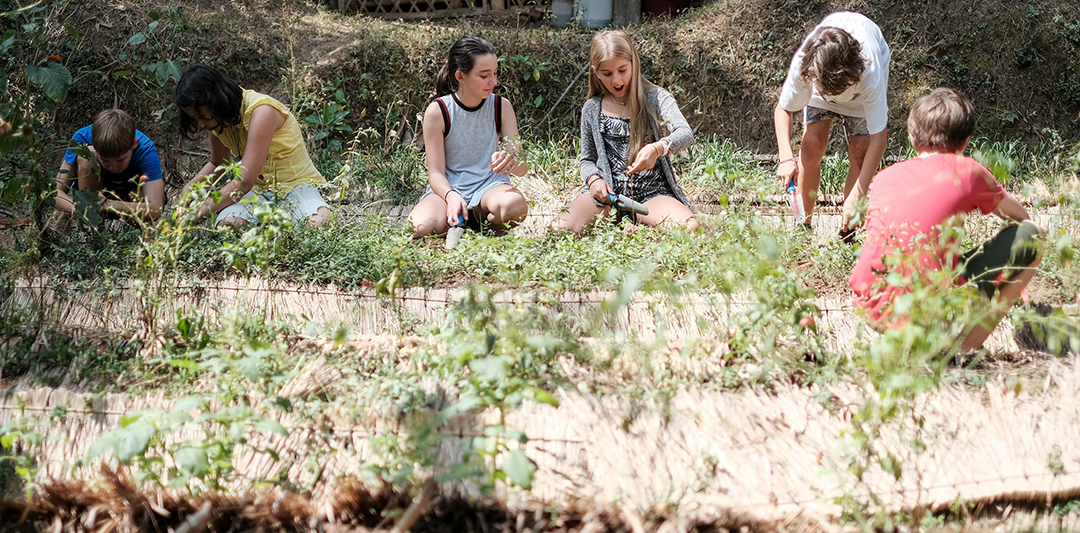How Middle School Students Grow Food – digging deeper on learning
Green School Middle School Teacher, Esther Milanzi and Kiley Little, takes us inside her student’s most recent project and integrated Thematic Project, Plant The Planet.
What Was the Inspiration Of the Project?
Bringing global context and purposeful learning to the fore, the foundation of the Green School Thematics classes in Middle School are the Sustainable Development Goals (SDG), released by the UN in 2015. These 17 global goals, focus on pressing global issues related to social, political, environmental and human rights.
In 7th grade thematics, we focus on goals related to Health, Healing and Well-Being.
In the first block of our school year, our unit was based around SDG #2 – End Hunger. Students viewed the documentary, “Starfish Throwers” as one of the learning activities in the six-week unit. This documentary follows three individuals – two based in America and one in India – who are agents of change in their respective communities. Each individual was actively trying to affect change in the lives of people who are hungry and impoverished. Students were particularly inspired by the story of Katie Stagliano and her crops. Katie was only 9 when she started to grow her own “krops” to help feed hungry and unnourished members of her own community. Her garden literally grew nationwide as it inspired others to do the same.
After watching the film, the students felt inspired to help those in need in our own local community and the idea of a 7th-grade edible garden blossomed.
The idea was to begin cultivating our own garden from which we could harvest crops that could be used to affect change in some way.
The name, “Plant the Planet”, came after a field trip to a nearby cooking school and food forest – New Earth Cooking – where students further came to understand the power, plausibility, and sustainability of planting, growing, and cooking your own food. They hope to affect change but also to share a message that if 7th-grade students can plant and harvest their own garden, others can too.
Can You Explain More About Thematics at Green School?
Green School has a unique pedagogy that operates under three frames of learning. The three frames are proficiency, experiential and thematic. The thematic frame is designed using an interdisciplinary approach engaging students using the Big Four multiple intelligences – intellectual, kinesthetic, artistic, and interpersonal. Middle School Thematics courses are planned into six week-units that integrate global awareness, history, science, literacy, and a variety of Green School skills. Projects throughout these units revolve around real-world themes, explore global issues, and encourage students to collaborate, communicate and learn together.
What Are Green School Skills and how were these woven into the project?
There are nine Green School skills that align with 21st century skills that each learning neighbourhood integrates in various ways. The edible garden project touches on many of the nine, but the three main skills this particular project helped students develop were: Activate, Problem Solve, and Collaborate. As a team, students developed a project plan to take action and make a difference. They created goals and timelines, and implemented processes to manage their time and those goals. In their smaller groups and at an individual level, students worked to find their role within the project, communicate, and collaborate within in their own smaller groups and as part of a larger group of thirty students.
End Goals
The end goals of the Grade 7 thematics are for students to gain an understanding of issues and solutions to global hunger, sustainable agriculture, and food security. For students to connect the historical and present context of the impacts of farming on the environment while also understanding how the growing human population impacts the environment and the ecosystems within it. As the project continues, students will start to understand linear and circular economies and the sustainable use and management of forests and the habitats living within. They will also develop analytical and inquiry skills by completing research activities and real-world simulations. Furthermore, students will develop leadership skills through building trust, networking, and project management by empowering others and themselves to meet goals.
Check out the student-run blog Plant the Planet to follow our students progress, meet the gardeners, and hear stories from the garden.
Authors: Green School Middle School Teachers, Esther Milanzi and Kiley Little




